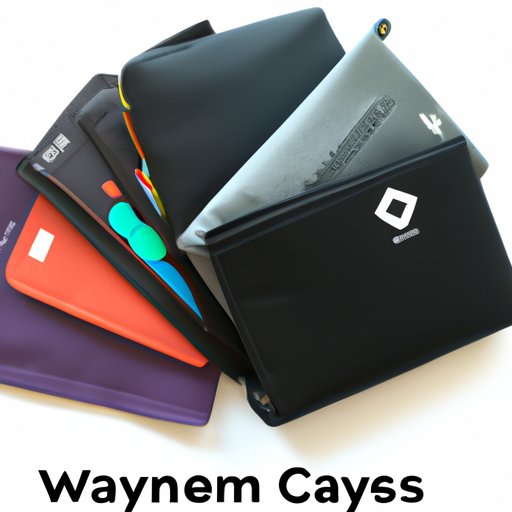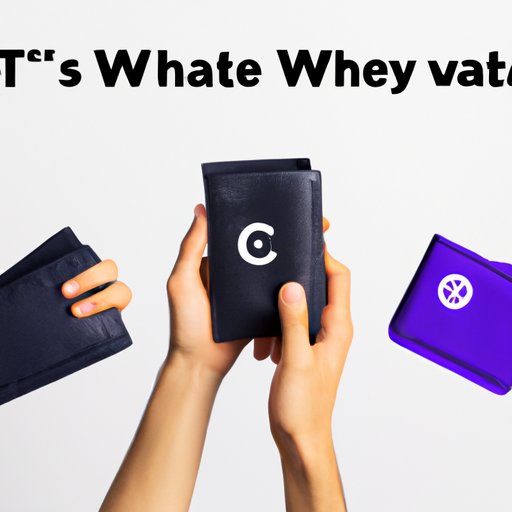Introduction
Cryptocurrency is a digital asset that is secured with cryptography and stored on a blockchain-based ledger. As cryptocurrencies become more popular, digital wallets have become essential for securely storing digital assets. A crypto wallet, also known as a digital wallet, is a software program that allows users to store, send, and receive cryptocurrencies like Bitcoin, Ethereum, and Litecoin. In this article, we explore the different types of crypto wallets available, their features, security considerations, and how to choose the right one for your needs.
A Comprehensive Guide to Different Types of Crypto Wallets
Crypto wallets come in a variety of forms, each with its own set of benefits and drawbacks. The most common types of wallets include hardware wallets, software wallets, paper wallets, and web wallets. Here is an overview of each type:
Hardware Wallets
Hardware wallets are physical devices designed to store private keys offline. They are considered the most secure type of wallet because they are not connected to the internet and cannot be hacked. However, they can be lost or damaged, so it’s important to back up your private keys. Popular hardware wallets include Trezor and Ledger.
Software Wallets
Software wallets are applications that allow users to store, send, and receive cryptocurrencies from their computers or mobile devices. They are less secure than hardware wallets because they are connected to the internet and can be targeted by hackers. Popular software wallets include Exodus and MyEtherWallet.
Paper Wallets
Paper wallets are physical documents that contain a user’s public and private keys. They are considered secure because they are not connected to the internet, but they can be easily lost or destroyed. Popular paper wallet generators include BitAddress and WalletGenerator.
Web Wallets
Web wallets are online services that allow users to store, send, and receive cryptocurrencies from their web browsers. They are the least secure type of wallet because they are connected to the internet and can be targeted by hackers. Popular web wallets include Coinbase and Blockchain.com.

An Overview of Major Crypto Wallets Available
There are many different types of crypto wallets available, each with its own set of features and functionality. To help you decide which wallet is best suited to your needs, here is an overview of some of the most popular crypto wallets available:
Popular Crypto Wallets
Trezor: A hardware wallet that supports Bitcoin, Ethereum, and other major cryptocurrencies. It features two-factor authentication, PIN protection, and an easy-to-use interface.
Exodus: A software wallet that supports Bitcoin, Ethereum, and other major cryptocurrencies. It features a built-in exchange, a portfolio tracker, and an easy-to-use interface.
BitAddress: A paper wallet generator that supports Bitcoin and other major cryptocurrencies. It features two-factor authentication, password protection, and an easy-to-use interface.
Coinbase: A web wallet that supports Bitcoin, Ethereum, and other major cryptocurrencies. It features a built-in exchange, a portfolio tracker, and an easy-to-use interface.
Comparing Features and Functionality
When comparing different crypto wallets, it’s important to consider the features and functionality offered by each one. For example, if you’re looking for a wallet that supports multiple currencies, then you should look for a wallet that offers support for a wide range of cryptocurrencies. Additionally, you should consider the level of security offered by each wallet, as well as the ease of use and cost associated with each one.
Exploring Pros and Cons of Different Crypto Wallets
Different types of crypto wallets offer varying levels of security, ease of use, and cost. Here is an overview of the pros and cons of each type of wallet:
Security
Hardware wallets are considered the most secure type of wallet because they are not connected to the internet and cannot be hacked. Software wallets are less secure because they are connected to the internet and can be targeted by hackers. Paper wallets are also considered secure because they are not connected to the internet, but they can be easily lost or destroyed. Web wallets are the least secure type of wallet because they are connected to the internet and can be targeted by hackers.
Ease of Use
Hardware wallets are the most difficult type of wallet to use because they require users to connect the device to a computer. Software wallets are easier to use because they can be accessed from any device with an internet connection. Paper wallets are also easy to use, but they can be easily lost or destroyed. Web wallets are the easiest type of wallet to use because they can be accessed from any device with an internet connection.
Cost
Hardware wallets are the most expensive type of wallet because they require users to purchase the device. Software wallets are less expensive because they can be downloaded for free. Paper wallets are also free, but they can be easily lost or destroyed. Web wallets are the least expensive type of wallet because they can be accessed from any device with an internet connection.
Security Considerations When Selecting a Crypto Wallet
When selecting a crypto wallet, it’s important to consider the level of security offered by each one. Here are some security considerations to keep in mind when choosing a wallet:
Private Key Management
It’s important to make sure that your wallet has a secure system for managing private keys. Some wallets offer two-factor authentication, while others offer multi-signature authentication. Make sure to research the security measures offered by each wallet before making your decision.
Password Protection
Make sure that your wallet has a secure password protection system. Look for wallets that offer two-factor authentication or multi-signature authentication for added security.
Multi-factor Authentication
Many wallets offer multi-factor authentication, which requires users to provide additional information such as a fingerprint, facial recognition, or pin code. Make sure to research the security measures offered by each wallet before making your decision.

What You Need to Know Before Choosing a Crypto Wallet
Before choosing a crypto wallet, there are a few things that you should consider. Here are some tips to help you select the right wallet for your needs:
Research the Wallet
Do your research and read reviews of the different wallets available. Make sure to compare the features and functionality offered by each one to make sure that it meets your needs.
Check for Compatibility
Make sure that the wallet you choose is compatible with the cryptocurrency you want to use. Some wallets only support certain cryptocurrencies, so make sure to check for compatibility before making your decision.
Understand Fees
Make sure to understand the fees associated with each wallet. Some wallets charge transaction fees, while others do not. Make sure to read the fine print before making your decision.

How to Choose the Right Crypto Wallet for Your Needs
Choosing a crypto wallet can be a daunting task. Here are some tips to help you make the right choice:
Consider Your Goals
Think about your goals and what you want to accomplish with your cryptocurrency investment. Do you want to invest long-term or trade short-term? Do you need a wallet that supports multiple currencies? Take the time to consider your goals before making a decision.
Analyze Your Risk Tolerance
Think about your risk tolerance and how much risk you’re willing to take. Consider the security measures offered by each wallet and make sure to select one that meets your risk tolerance level.
Review the Options
Compare the different wallets available and review the features and functionality offered by each one. Make sure to understand the fees associated with each wallet and read reviews from other users.
Conclusion
Crypto wallets are a secure way to store digital assets. There are a variety of different types of wallets available, each with its own set of benefits and drawbacks. It’s important to consider your goals, risk tolerance, and the features and functionality offered by each wallet before making a decision. By following these tips, you can ensure that you select the right wallet for your needs.
(Note: Is this article not meeting your expectations? Do you have knowledge or insights to share? Unlock new opportunities and expand your reach by joining our authors team. Click Registration to join us and share your expertise with our readers.)
